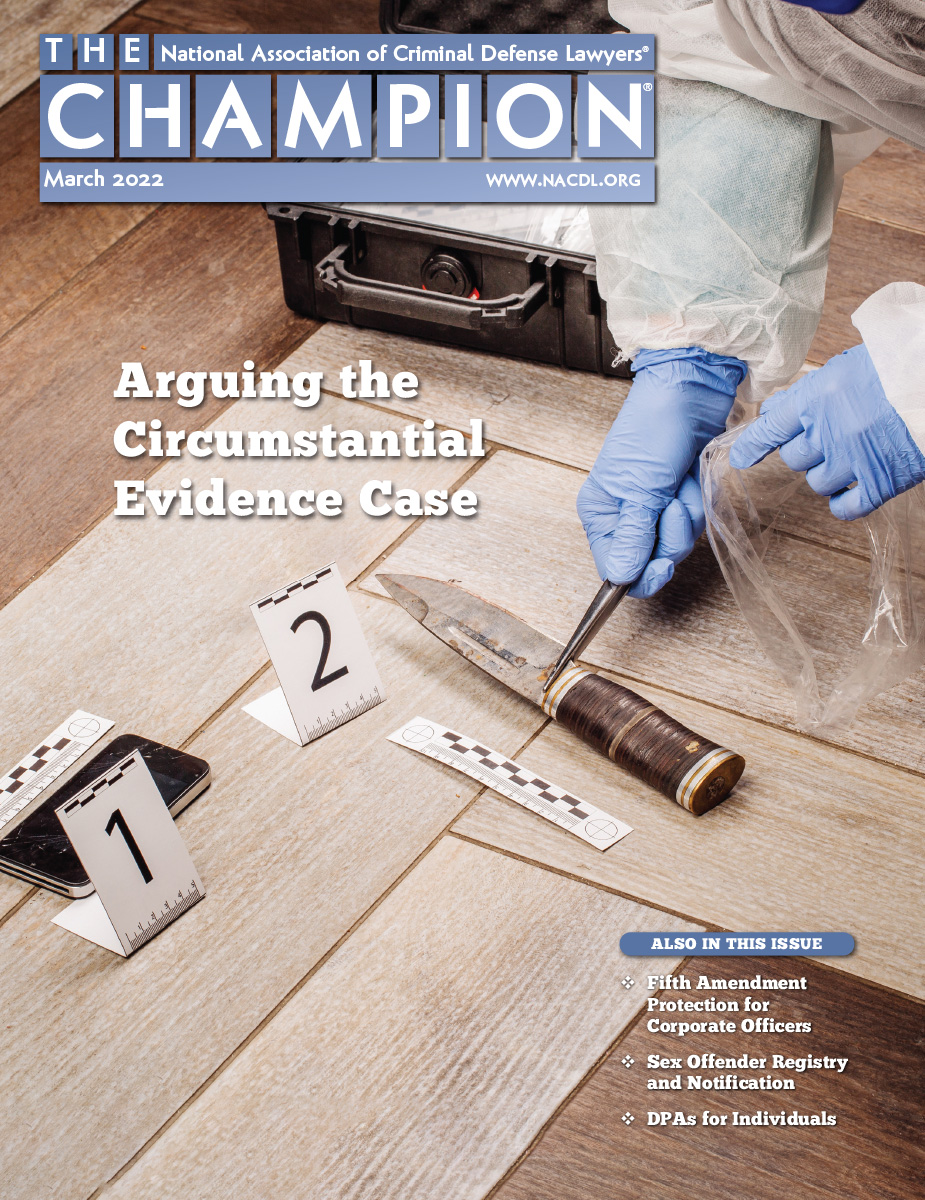March 2022

What are the problems, perils, and pitfalls in cases involving circumstantial evidence?
Articles in this Issue
-
Affiliate News
What events are NACDL affiliates hosting this month? Find out here.
-
Book Review: Death on the Doorstep & other stories by Edward Z. Menkin
This month Matthew T. Mangino reviews Death on the Doorstep & other stories by Edward Z. Menkin.
-
Book Review: Until I Could Be Sure by George H. Ryan Sr. with Maurice Possley
This month Tony Bornstein reviews Until I Could Be Sure: How I Stopped the Death Penalty in Illinois by George H. Ryan Sr. with Maurice Possley.
-
Circumstantial Case — Circumspect Conviction
Defense attorney Rauch Wise says that if the criminal legal system is going to honor the “beyond a reasonable doubt” standard, the system must do a better job of pointing out the importance of heighten scrutiny in cases involving circumstantial evidence. To prove a circumstantial evidence case, he writes, jurors must be informed that there can be no reasonable explanation other than the guilt of the defendant. Jurors must understand that the government has the obligation to eliminate any other reasonable explanations.
-
Cross Country: Asymmetrical Cross-Examination
Asymmetrical cross-examination uses chapters that do not perfectly align with the opponent’s chapters of direct examination.
-
DWI: The Godmother of Field Sobriety Tests: The Best of the Worst
Robert Reiff discusses the work of Dr. Marcelline Burns, one of the creators of the Standardized Field Sobriety Tests that police officers use when investigating DUI/DWI cases.
-
From the President: Boston, Workers, and the Trial Penalty
Expanding the Reach of Criminal Laws Without Increasing the Burdens on the Prosecution
Many voices have sounded the alarm and are mobilizing to untangle the complex web of laws, rules, and culture that authorize coercive plea bargaining practices.
-
Long Overdue: Fifth Amendment Protection for Corporate Officers
Professor Tracey Maclin examines and challenges the collective entity rule, which is the Supreme Court’s long-standing view that an individual who works for a company is not protected by the Fifth Amendment when compelled to produce incriminating records that belong to the company. Maclin says the collective entity rule defies the text of the Fifth Amendment, the common law history of the privilege, and the Court’s Fifth Amendment precedents.
-
NACDL News: NACDL Condemns Inhumane Conditions at the Metropolitan Detention Center in Brooklyn
NACDL News for March 2022
-
NACDL News: NACDL Welcomes BOP Rule Allowing the Release of Thousands Under the First Step Act
NACDL News for March 2022
-
NACDL News: Virginia Redemption Project Secures Release, Continues Work in Hopes for More
NACDL News for March 2022
-
Non-Prosecution, Deferred Prosecution, and Pretrial Diversion Agreements: Just Say No to Pleas
Deferred prosecution agreements are almost exclusively used in corporate prosecutions, but they are occasionally offered to individuals. Non-prosecution agreements, on the other hand, may be easily obtained for fact witnesses when defense counsel does not want to take the chance that a client is more culpable than originally thought. What are the most critical factors that influence prosecutors to enter into an NPA or a DPA?
-
Sex Offender Registry and Notification: How Did We Get Here?
The goal of trying to put an end to child sex offenses is one on which everyone can agree. The best way to meet that goal, however, is debatable. Individuals that children know are responsible for 90% of sex crimes against them. Alix Deschamp discusses the origins of the Sex Offender Registration and Notification Act and shows how the original legislation developed into not only a law enforcement tool but also a punitive measure.
